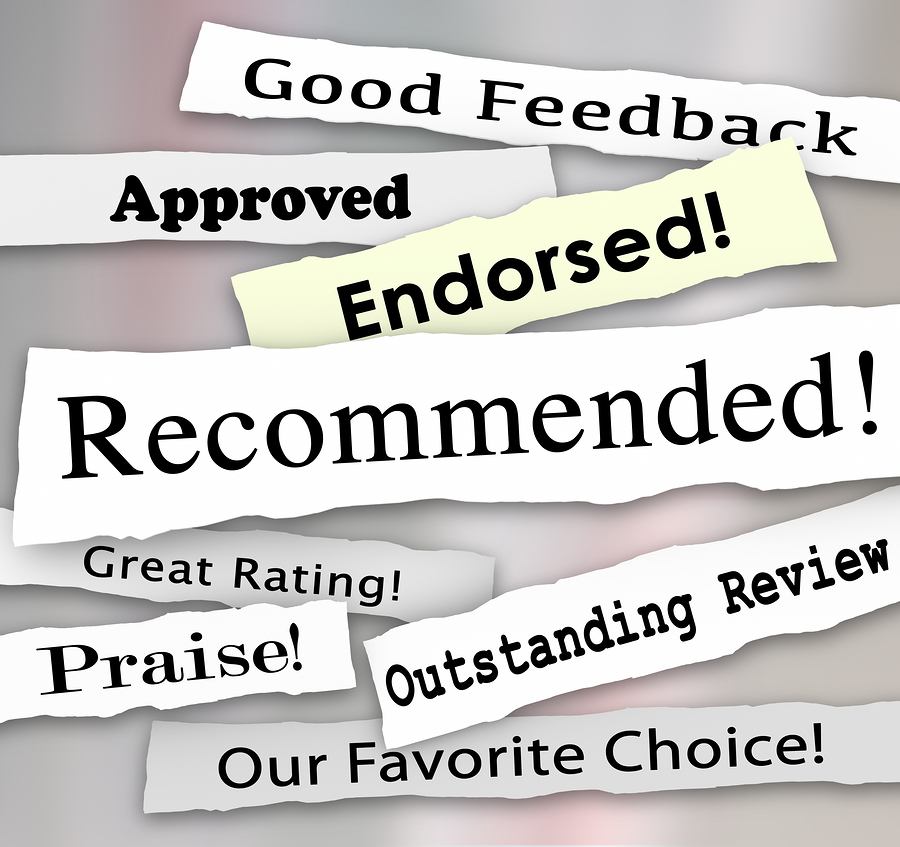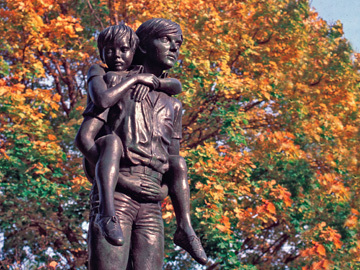I often tell developing writers that it is never too early to get a strong endorsement for your book project. In fact, I have included endorsements in book proposals—both my own and clients’ proposals. Every little bit helps, don’t you know.
Invariably, when I start talking about endorsements, a flurry of questions comes. In fact, a writer friend (of long and wide experience in publishing) emailed me recently to ask a few questions about endorsements, so I thought I’d add a few others and do my best to answer them in this post.
What is an endorsement?
In book publishing terms, an endorsement is a short recommendation of you or your book (more on that in a moment) from someone who is famous or expert enough to persuade people to buy and read your book.
There are three common types of endorsements:
1. An endorsement of your book (or manuscript). This, of course, suggests that the person has read it, or at least enough of it, to place his or her reputation alongside yours.
2. An endorsement of you. An endorsement such as “Bob Hostetler is the best writer in his field today” doesn’t refer to the book but to the author (or his or her oeuvre) as worthy of attention.
3. An endorsement of your subject matter. Sometimes you’ll see an endorsement on a book cover along the lines of, “Bob Hostetler’s new book tackles a timely and crucial topic for everyone in the ukulele industry.” That doesn’t necessarily mean the endorser has read your book, only that the topic is near and dear to their heart (and really, who doesn’t love ukuleles?).
Who should I ask for an endorsement?
Remember that the purpose of an endorsement is persuading buyers and readers. So, an endorser should be recognizable, perhaps because he is famous or because she occupies a position or would be considered an expert by a potential reader. Fellow authors may not be persuasive endorsers, unless they or their books are well known among your potential readers (so, for example, while Stephen King is certainly famous, you probably wouldn’t ask him to endorse your Amish romance).
How do I get endorsements?
Every which way you can. Perhaps you know someone who knows a potential endorser. I’ve asked colleagues for introductions. I’ve messaged someone on Facebook. I’ve also taken a shot in the dark, so to speak, and written a letter (on actual paper!) to an endorser c/o his publisher.
Is it kosher to ask people whose books I’ve quoted within my manuscript to endorse my book?
I think so. A few years ago, while writing my book, How to Survive the End of the World, I realized that I quoted one of my favorite authors several times. So, I wrote to him c/o his publisher (as I mentioned above), mentioning that his book was not only a favorite of mine but was also excerpted (fairly and favorably, of course) in my manuscript. A couple of weeks later, that famous author called me, introduced himself, and said he’d “love” to read my manuscript. He did, and replied with a glowing endorsement that now graces the cover of that book—above the title.
Can I use the same endorsers in a new book that I used in a previous one?
Yes and no, in my opinion. You shouldn’t “recycle” endorsements; that is putting someone else’s words to use in a way they may not have intended. However, I did once get an endorsement from another famous author that included the words, “Bob Hostetler is one of my favorite writers; I read everything he writes!” It went on to praise that specific book. A book or two later, I contacted that endorser and asked if I could use just that part of his previous endorsement for an upcoming proposal and book. He agreed.
Is it okay to ask someone I mention in the Acknowledgments or someone who writes my foreword as an endorser?
I don’t see why not, though a foreword is usually just a lengthy endorsement, so a foreword would make an endorsement redundant. However, sometimes a publisher will pull a quote from the foreword to feature on the cover.
How many endorsements are too many? Too few?
There are no hard and fast rules, but when a writer says, “I think I could get an endorsement from so-and-so,” I urge him to do it now, as even one strong endorsement in a book proposal can induce an editor to read further. And some books include several pages of endorsements in the front matter (my book, The Bard and the Bible: A Shakespeare Devotional, includes eight—and a few more on the website).
Are there other “rules” or conventions we should know about?
I would add this: Don’t say “no” for anyone. Inviting endorsements is a great time to dream. As I was writing The Red Letter Prayer Life (17 Words from Jesus to Inspire Practical, Purposeful, Powerful Prayer), I thought it would be a dream come true to have an endorsement from Phyllis Tickle, who had influenced my own prayer life through her books and speaking. I had heard that her health was declining, but I contacted her anyway, and she not only surprised me by reading my manuscript but also by issuing a beautiful endorsement (which I treasure even more since she went to heaven in 2015). Not everyone says yes, of course (or even answers), but I have been impressed often by the accessibility and kindness of famous people I admire (which makes me admire them even more).



 The Island of Lost Boys
The Island of Lost Boys

Thank you for this extremely helpful article. You have deepened my understanding of endorsements.
Now, off to brainstorm a list of possibilities. Have a wonderful day! ?
Thanks, Rene. You have a wonderful day, too.
Bob, I recently ask for endorsements from two notable authors/speakers, not expecting to be granted either. Yet both graciously agreed to the endorsement if they could be granted a pre-release copy of the book to read prior to the endorsement. I was, of course, thrilled and glowing with appreciation for their graciousness.
That said, what I have here is something of a pre-endorsement, or a potential endorsement. How do you work with something like that?
Damon, in a case like that, some book proposals include a list of “promised endorsements/likely endorsements.” I don’t think it does much good to list “hoped-for endorsements” or “people I will ask to endorse” in a proposal, but a promise like you have in hand is worth mentioning.
Thank you for the kind reply Bob. That was my take on it as well.
Interesting, as usual, Dan. While I might pay some attention to endorsements of nonfiction works by well-known people in that field, I don’t at all for fiction. Am I unusual in that? Do you think endorsements carry much weight for most people when it comes to fiction?
Don’t know why I typed Dan, Bob. I really do know the difference between the two of you, and I love what both of you post, especially the way you give real answers to our questions and actionable advice. Many thanks for that!
I could do worse than be mistaken for Dan. Not MUCH worse. But a little worse.
Do the same principles apply to asking for endorsements for a novel? Or are they more specific to nonfiction?
Some points more than others, but yes, the above applies also to fiction.
Thanks, Bob! I hadn’t thought about this as part of the process of publishing. I’ll be including it on my “to do” list.
Thanks for saying so, J. D.
OK, Bob, here you go…and you don’t even have to wait till Christmas, nor mess with discarded wrapping paper.
“Bob Hostetler’s writing is engaging, funny, and challenges readers to become more than they ever thought they could be. He’s changed thousands of lives through his endearingly grace-filled books; let yours be next.”
Whoa, Andrew. You’re now my favorite.
I’m going to save this for when you become famous. Which could be, should be any day now.
Bob, you just made my day! 🙂
And you, mine.
What is the etiquette for requesting endorsements? I guess everybody knows it’s just part of it, but surely there are some definite don’ts. What should we avoid saying, and how do we avoid flattery AND self-aggrandizement while attempting to make writing nice things about us sound tempting?
I’d say “Don’t be presumptuous,” “Don’t be too wordy,” “Do be sincere,” and “Do make it as easy as possible.” So, I will often start a request by saying something like, “I’m sure you’re very busy so I will try to keep this short.” And I’ll often conclude by suggesting several choices (I could send the manuscript, or a sample of it, or whatever makes it easiest for you). Heck, we’re writers, right? We ought to be able to write something attractive or even compelling, beyond just, “pretty pretty please?” 🙂
Only don’t botch it. See what I did there!
What a great suggestion, Rebekah!
so, do YOU write endorsements? and is a blog comment an acceptable venue to ask for one?
seriously, though, this is a good article, and i will save for future reference!
Funny, Robin. Actually, I used to, though I’m not nearly famous event that I should. But an endorsement from an agent (who isn’t famous) is unlikely to help anyone very much. But thanks for the comment!
thanks for the article!! and Merry Christmas!
“famous ENOUGH.” Sheesh.
I’ve had great success with asking for endorsements from well-known authors. If they all haven’t written an endorsement, I’d say 95% of them responded to my queries. Even “cold-calling” them through their website contact form. The trick is finding some relational connection. I’ve gotten a couple endorsements from NYT best-selling authors, and quite a few from other authors I love and respect, but all of them (except one) came through some sort of relationship or interesting info that somehow linked us. “Hey, I noticed we belong to the same publisher, would you be willing to . . .” or “Hey, I love your books, and am actually writing in the same genre, would you be willing to take the time to read the first 15 pages of my book and consider whether or not you’d be willing to write an endorsement (if it met your expectations for quality/style/etc.)?” Wasting as little of their time as humanly possible helps your chances.
Brennan, great comment, as usual. You’re so right. A little respect and sincerity goes a long way in these things.
Thanks for the food for thought, Bob. Now then, who do I know…..
Thank you for unpacking the ins and outs of endorsements for us. This is a guide for future use and will be bookmarked. I only know one famous writer, but she writes historical fiction. I write Christian nonfiction. But she does write articles for spiritual publications. That might work.
This has got me to thinking. I have an Anglican priest’s endorsement and an abbot’s foreword, he offered to write it, for a crossover book I’ve written on meditative prayer and the gift of contemplative silence. (I’m not Catholic or Anglican) I’ve been told it won’t make it because it is neither Protestant or Catholic by some people in the know. But both of them are excited about it and said I’ve got something special that may go some place. Who knows? Well, God knows.
Thank you.
Bob, this is good stuff. I never thought I’d be asked to endorse another’s work–never even thought I’d make it into print myself–but making connections early and often is always a good thing. Thanks for giving us some guidelines.
Timely post as always, Bob. Sending out endorsement emails tonight. 🙂 Reaching out to famous authors is an excellent (and exhilarating) idea! Hmm, which several favorite authors in the genre that I write can I reach out to? Oh, how exciting!
Ok Im inspired now to ask big. The worst they can say is “no.” Thanks
Egg-ZACT-ly.